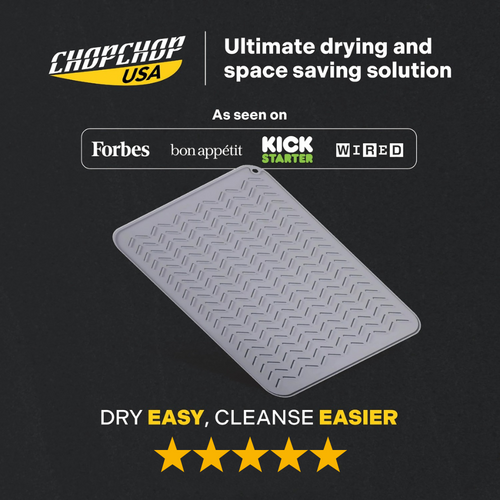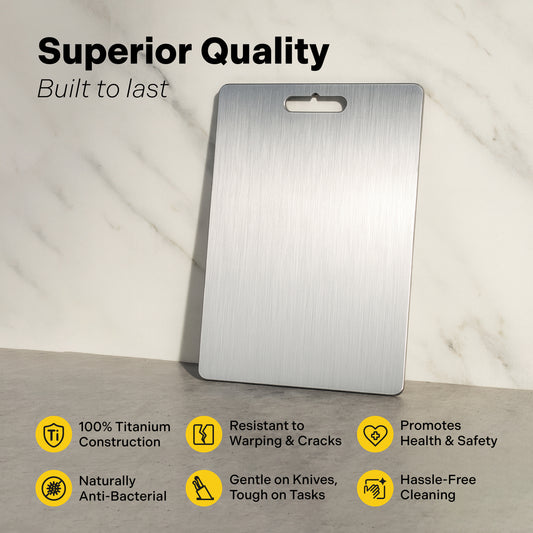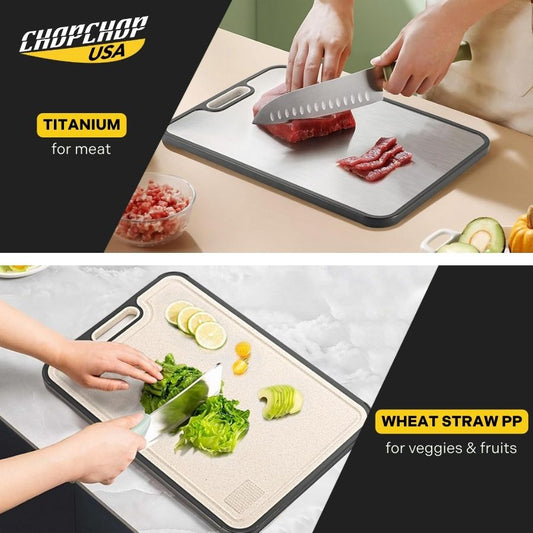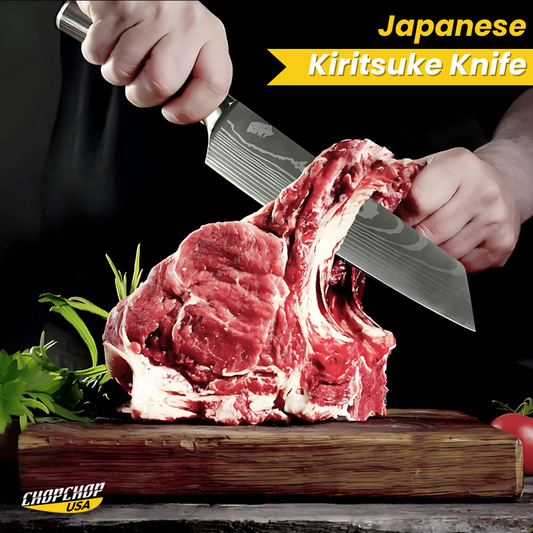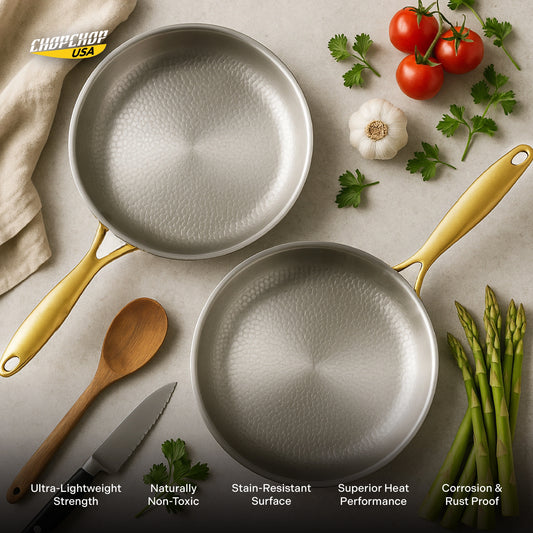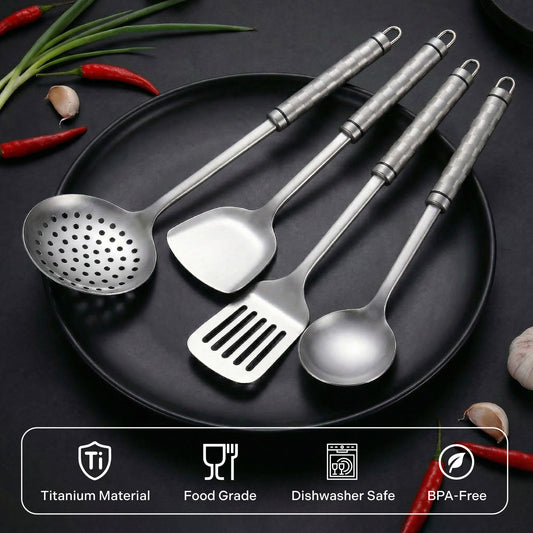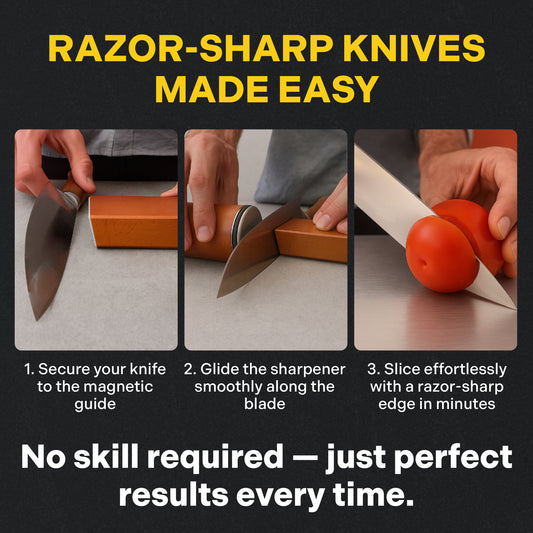What is the best steel for Japanese knives, and why does it matter? The best steel for Japanese knives determines sharpness, durability, ease of sharpening, and long-term value. Choosing the best steel for Japanese knives ensures superior performance, better edge retention, and a smoother cooking experience.
In this guide, ChopChop USA will break down the best steel for Japanese knives, explain how each steel type performs, and help you choose the ideal option depending on your cooking style, skill level, and maintenance preferences.
How to Choose the Right Knife for You

Selecting the best steel for Japanese knives depends on how you cook and the level of maintenance you're comfortable with. Here’s a quick breakdown:
For Home Cooks
Stainless steel or clad steel knives are ideal because they are durable, easy to maintain, and resistant to rust. These steels provide consistent performance without requiring meticulous care—perfect for busy kitchens.
For Professionals
Carbon steel or powdered steel knives offer unmatched sharpness, precision, and responsiveness. Chefs who demand the highest performance often choose these options because they sharpen easily and deliver laser-like cuts.
For Gift Buyers
Damascus or premium stainless steel knives make exceptional gifts. They combine beauty, function, and long-term reliability—appealing even to recipients who are not knife experts.
Best Steel for Japanese Knives

This section explores the most popular steels used in Japanese blades. Each contributes uniquely to performance, sharpening, durability, and overall handling. To better understand the best steel for Japanese knives, let’s look at the main categories.
High-Carbon Steel (for maximum sharpness)

High-carbon steels are often considered the best steel for Japanese knives because they deliver unmatched sharpness and cutting precision.
White Steel (Shirogami)
White Steel is a traditional carbon steel celebrated for its purity, fine grain, and ease of sharpening, making it one of the best steel for Japanese knives.
- White Steel #1: Offers the sharpest, hardest edge but is more brittle, requiring careful handling.
- White Steel #2: Slightly softer and easier to maintain, making it more suitable for everyday kitchen tasks.
Its ability to achieve an ultra-thin, razor-like edge makes White Steel prized by professional chefs and serious home cooks who value precision. White Steel knives require regular care to prevent rust but reward users with extraordinary cutting performance.
Blue Steel (Aogami)
Blue Steel improves upon White Steel by adding chromium and tungsten, increasing durability, edge retention, and resistance to wear. It is considered one of the best steel for Japanese knives for high-performance applications.
- Blue Steel Super (Aogami Super): Extremely hard and long-lasting, this variant is among the highest-performing carbon steels available.
Its combination of hardness and stability allows it to maintain sharpness over extended use, making it ideal for professionals and home chefs who want long-term precision. While slightly more demanding to maintain than stainless steel, Blue Steel rewards users with exceptional cutting efficiency and edge longevity.
Stainless & Semi-Stainless Steel (for low maintenance)

Stainless steels offer a balance of sharpness and convenience. They are ideal for cooks who want high performance without constant upkeep.
VG-10
VG-10 is a premium stainless steel widely recognized in Japanese knives for its exceptional performance and reliability.
- Excellent rust resistance ensures long-lasting durability even in humid kitchens.
- Great edge retention allows the blade to stay sharp through extensive use.
- Sharpens relatively easily for maintaining a fine cutting edge at home or professionally.
VG-10 is regarded as one of the best steel for Japanese knives for home cooks because it combines consistent sharpness, low maintenance, and strong performance, making it a top choice for everyday cooking while providing a professional-level cutting experience.
Ginsan (Silver 3)
Ginsan, also known as Silver 3, is a semi-stainless steel that delivers excellent sharpness with moderate rust resistance.
- Takes a keen edge suitable for precision slicing and chopping
- More traditional carbon-steel feel gives a familiar, responsive cutting experience.
- Easier maintenance than fully carbon steels reduces care requirements while maintaining high performance.
It is frequently cited as one of the best steel for Japanese knives for cooks who want the precision of carbon steel without the full maintenance demands, offering a practical balance of sharpness, durability, and usability.
R-2 / SG-2
R-2 (also known as SG-2) is a high-performance powdered steel designed for superior cutting performance and long-term durability.
- Exceptional edge retention keeps blades sharp longer between sharpenings.
- High hardness allows ultra-fine, precise cutting.
- Durability ensures the knife withstands heavy use without chipping.
SG-2 is considered one of the best steel for Japanese knives in modern high-end blades because it provides lasting sharpness even in high-volume kitchens, making it ideal for professional chefs and serious home cooks who require superior performance in every task.
ZA-18
ZA-18 is an advanced stainless steel that surpasses VG-10 in hardness, corrosion resistance, and longevity.
- Higher chromium content improves rust resistance.
- Great sharpness maintains fine cutting edges with ease.
-
Excellent longevity ensures the blade performs consistently over time.
As a rising star in knife-making, ZA-18 is often considered one of the best steel for Japanese knives for long-term value, combining cutting-edge performance with practical maintenance. Its strength and precision make it ideal for both professional chefs and home cooks seeking a premium, reliable knife.
Other Types

Beyond traditional choices, these steels offer unique benefits.
Powdered Steel
Steels like R-2 and SG-2 belong to the powdered steel category, known for exceptional performance and durability.
- Superior edge retention ensures the blade stays sharp longer.
- High hardness allows precise, clean cuts.
- Good corrosion resistance provides reliability with proper care.
These steels are considered some of the best steel for Japanese knives, ideal for advanced users and professionals seeking long-lasting, high-performance blades
Damascus Steel
Damascus steel features a hard cutting core with multiple layered cladding for beauty and flexibility.
- Visually stunning wave patterns
- Strong core
- Enhanced toughness
While Damascus refers to the layering process—not one specific steel—it is still commonly included when discussing the best steel for Japanese knives.
Molybdenum Steel (AUS-8 / AUS-10)
Molybdenum steels, including AUS-8 and AUS-10, offer an affordable yet reliable option for Japanese knives. They provide a practical balance between performance, durability, and ease of maintenance, making them ideal for budget-conscious cooks who still want quality.
- Good corrosion resistance ensures the blade resists rust and staining.
- Decent sharpness allows effective slicing, chopping, and general kitchen prep.
- Easy maintenance reduces the time and effort needed to keep the blade performing optimally.
These steels are considered some of the best steel for Japanese knives for users seeking dependable performance without investing in premium-priced blades.
ChopChop USA Kiritsuke Knife — High Carbon Stainless Steel Knife

The ChopChop USA Kiritsuke Knife blends Japanese craftsmanship with premium high carbon stainless steel, engineered for razor-sharp performance, long-lasting strength, and precise control for chefs and home cooks alike.
Ultra-Sharp High Carbon Stainless Steel Blade
Crafted from premium high carbon stainless steel, the blade offers exceptional hardness—far superior to standard kitchen knives. This ensures outstanding edge retention, long-lasting sharpness, and powerful cutting performance across all ingredients.
Precision You Can Feel
Each blade is laser-tested for perfect sharpness and thinness, allowing it to glide smoothly through vegetables, meats, herbs, and more. Whether you slice, mince, dice, or julienne, every cut feels seamless and efficient.
Ergonomic, Slip-Resistant Handle
Engineered for comfort and stability, the handle provides a secure, slip-resistant grip. From fast-paced chopping to delicate knife work, you maintain complete control and confidence with every movement.
Specifications
• Dimensions: 12.4" (31.5 cm) x 7.9" (20.3 cm) x 4.5" (11.3 cm)
• Material: High Carbon Stainless Steel
Bring professional-grade precision into your home kitchen. The ChopChop USA Kiritsuke Knife delivers the sharpness, balance, and reliability of Japanese craftsmanship—paired with the strength and durability modern cooks demand.
Conclusion
Understanding the best steel for Japanese knives helps you choose a blade that fits your cooking style, maintenance habits, and performance expectations. From carbon steel to stainless, each type brings unique advantages.
If you want a high-performance, durable, and beautifully engineered knife, the ChopChop USA Kiritsuke Knife delivers exceptional value and precision for both home cooks and professionals.
FAQs
What is the best steel for making knives?
The best steel for making knives is high-quality carbon steel, known for extreme sharpness, easy sharpening, and excellent edge control, making it ideal for precision cutting performance.
Why do chefs prefer carbon steel knives?
Chefs prefer carbon steel knives because they deliver superior sharpness, precise control, and a responsive cutting feel. They require more care but reward users with unmatched performance.
Is SG2 better than VG-10?
SG2 generally outperforms VG-10 with higher hardness, longer edge retention, and superior durability. However, VG-10 offers easier sharpening and is ideal for everyday home use.
What is the best material for Japanese knife handles?
Traditional Japanese knives often use magnolia wood with a buffalo horn ferrule, while modern versions may feature walnut or pakkawood for improved durability, comfort, and aesthetics.
What makes carbon steel one of the best steel for Japanese knives?
Carbon steel achieves extreme sharpness, offers excellent edge control, and sharpens easily. Its performance and responsiveness make it highly favored for high-precision Japanese knives.


